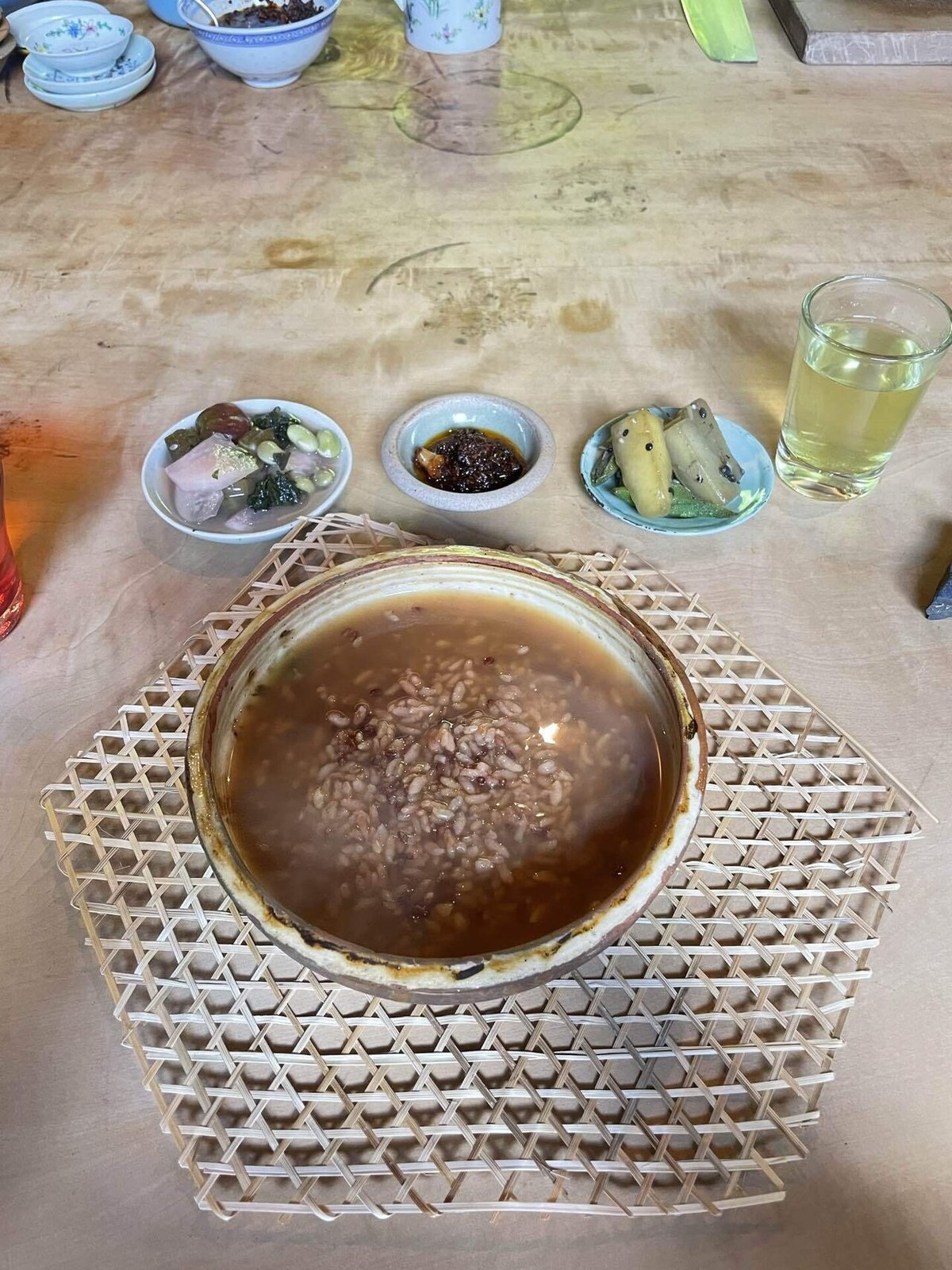
【遠月 バイトの卒業】
English ver.
An Evening of Nostalgia and Future Dreams
It was only supposed to be for one day.
On July 7th, 2022, during the Japanese festival Tanabata (a holiday celebrating the legend of two star-crossed lovers), a special event called Hoshi Matsuri ("Star Festival") took place at Farmoon, a unique restaurant near Kyoto’s Ginkaku-ji Temple. This event featured two talented chefs: Izumi-san, a chef from Jiki Miyazawa (a fine dining restaurant in Kyoto where I used to work part-time) and Masayo-san, Farmoon’s owner and chef.

I was fortunate to help out with this event.
That day, I felt something deeply moving and nostalgic. I felt warmly connected to the past, fully alive in that moment, and somehow also felt a resonance that seemed to echo into the future.

In high school, my parents gave me a book called Alice’s Delicious Revolution. The book describes the food philosophy of Alice Waters, owner of the famous Chez Panisse in California — a restaurant so popular it’s often impossible to get a reservation. This book became my “bible,” deeply influencing my studies. Later, at university, I specialized in food studies and focused especially on slow-food philosophy (Alice Waters was one of the founders of this movement) and food activism, studying under a professor who was an expert in these fields. Somehow, being at Farmoon reminded me so much of Alice Waters’ world. The space, the people, and the overall atmosphere seemed to echo her food philosophy, even though words can barely capture the feeling. I asked Masayo-san if she’d ever heard of Alice Waters. She responded, “Of course! I actually worked in her kitchen.” I felt amazed and deeply inspired.
Another thing that connected me to Farmoon was their use of zara-cha, a unique herbal tea from Tsuwano, a small town in Shimane Prefecture (a rural area in western Japan). Zara-cha is made from kawaraketsumei, a legume plant with a long history in Tsuwano. I spent three years of high school in Tsuwano through a rural exchange program, so zara-cha brought back a comforting, “second-home” feeling for me. I was even more surprised to find out that Farmoon sourced their zara-cha from someone I knew from my high school days.
Right then, I found myself saying to Masayo-san, “I’d love to keep working here at Farmoon! Please let me!” Looking back, I realize I could have been more polite and thoughtful in expressing myself — it’s a little embarrassing now lol
After that, I ended up working at Farmoon until I graduated from university.
To Masayo-san, the staff, and everyone I met through Farmoon, thank you for all the warmth and connection.

At Farmoon, I experienced countless moments of connection, sharing memories and emotions with others over delicious food. I learned how food can connect people across senses, memories, and cultures. I discovered how deeply food ties people together, and that to maintain cultural diversity, it’s important to have relationships where people can see and truly know each other. By joining this world and engaging in these conversations, I felt like I was reconnecting with my roots. It’s a priceless culture where the past, memories, and people’s connections all overlap, creating a beautiful tapestry — and right at the center of it are seasonal, local ingredients.

Through Masayo-san’s artistry, every dish, space, and moment at Farmoon felt like a warm hug — both comforting and elegant. She has a remarkable way of letting fresh ingredients shape her menu, choosing what’s in season rather than planning the menu in advance. Freshly picked vegetables felt beautiful just to look at, and I found myself moved by the changing ingredients with each season. Working alongside someone who weaves together these moments so thoughtfully made me feel incredibly lucky.
Even during staff meals, my “joy radar” was always on high alert. Masayo-san’s food was so delightful, I’d often feel like dancing, and the lively conversations around the table made me never want to leave. Through Masayo-san’s cooking, I felt like I’d traveled the world, and at other times, I could feel the blessings and energy of the Ohara region, where Farmoon is located. These meals felt like a kind of magic — unforgettable food experiences that touched my heart.

Working with the team in the kitchen was also a joy. Sometimes, Masayo-san would let us taste herbs or flower buds used in cooking, and these tiny bites helped me discover the natural bittersweet and tangy flavors of wild plants. These experiences grounded me, while also making me feel the passing beauty of each season.
Since that Tanabata evening, I’ve learned so much at Farmoon.
To read the subtle feelings of others, to care for people sincerely, to move with a sense of gratitude.
To let my heart guide me to enjoy, think about, learn from, and create in the world of food.
My days at Farmoon, filled with love and discovery, were truly happy times.
It’s a place I long to return to, a place I’ll always hold dear.
Thank you for this wonderful connection.


日本語 ver.
懐かしい未来の夜
一日だけのはずだった。
2022年、7月7日 七夕の日にもともとアルバイトしていた京都の割烹料理屋(じき宮ざわ)の料理人さん(泉さん)と、京都の銀閣寺付近にあるFarmoonのオーナーシェフ(まさよさん)コラボレーションイベント「星まつり」がFarmoonで行われた。
有り難いことに、私はそのイベントのお手伝いとして関わることができた。
その日私は、素朴で温かくて、懐かしい感覚になるのと同時に、この瞬間を生きている実感をし、そして未来へ響く音を聞いた。
高校時代に親からもらった「アリスの美味しい革命」という本は、全米で最も予約の取れないレストラン「シェ・パニース」のオーナー、アリス・ウォータースの料理哲学が載っていて、私のバイブルでもある。その影響もあって、大学では食の学問領域をコーディネートする研究をし、特にスローフード哲学(アリスはスローフード運動の提唱者)と食のアクティヴィズムを専門とする教授の元で学んだ。Farmoonにいると、なぜかそのアリスを感じた。空間や周りの人の感覚が、私が本で見ていた、あの料理哲学に似ていた。というか言葉では表すにはもったいない気持ちになった。そこでまさよさんに「アリス・ウォータースってご存知ですか」と聞くと、「もちろん!キッチンで働いたこともあるよ」とのこと。私は驚きと感嘆に満ちた心境になった。
さらに、Farmoonで「ざら茶」を使って茶粥を作ったりブレンドティーを作ったりしていたことも私の中でぐわっと心を寄せられた要素の一つだ。ざら茶は津和野町という土地で昔から飲まれてきたマメ科カワラケツメイのお茶である。
地域みらい留学という制度を利用して高校時代を3年間島根県の津和野町で過ごした私にとっては、第二の家の味である馴染み深いものだった。しかも、私が高校時代にお世話になった方からご購入されているという。
私はもうその場でまさよさんに、Farmoonに関わり続けたいです!お願いします!と言った。もう少し言葉を選んで、丁寧に伝えるべきだったなあと今となっては恥ずかしい。
そして、この七夕の日から大学卒業までここでアルバイトさせてもらった。
大きな愛で接してくださったまさよさん、スタッフの皆、Farmoonを通じて関わった方、ありがとうございます。

Farmoonでは、美味しいものを食べて他者と心が重なり合ったり、感情や記憶を五感で共有したりする場面に出会い、私も体験した。そして文化の多様性と継続には、顔が見える関係であることが重要だと学び、そしてその世界に参加し対話することで自分の根っこの部分を取り戻すことができると思った。過去との連続性、記憶との連続性、人と人との繋がりであるすべてが重複して絡み合ったかけがえのない文化。そして目の前にある季節の食材。
何を大切にするのか、その判断をするための学びがあった。
まさよさんの審美眼によって作り出される、料理、空間、空気感は、陽だまりのような温かい優しいハグと、凛とした美しい宇宙がかけ合わさったようだと私は感じている。まさよさんは常に受け身で、これを作りたいから手に入れるのではなく、目の前にある食材からメニューを決めていく。採れたての野菜は目に見て美しいなと思うし、季節で変わる食材の美しさに心が動く。一瞬一瞬を豊かな時間として紡いでいるまさよさんの近くで働けた私は、本当に幸せものである。
まかないのときにも、私のときめきレーダーはいつもMAXで、「わ~~!」とつい踊りたくなる料理を用意してくださり、熱い対話とともに過ごす時間が私にとってかけがえのない時間で、大好きすぎて机にへばりつきたい気分に何度なったことか。まさよさんのまかないで、世界を旅した気分になったり、大原の土地の恵みとパワーを感じたり。瞬間的に魔法が起こり、私の心に触れる食体験であった。
キッチンでみんなで作業をするのもすごく心地よい気分になった。作業中にまさよさんは料理に使う野草や蕾などを少しかじらせてくれて、それで自然の苦みや甘酸っぱさを知った。癒やされたり旬の変化の儚さを感じたりして、刺激された。
私は、あの七夕の夜からFarmoonでたくさんの気づきを得た。
人の機微を読み、純粋に人を想い、感じて動くこと。
心の好きに従って、食べるを 愉しみ、考え、学び、継ぎ、創造すること。
愛溢れるFarmoonでの日々はとても濃くて、幸せだった。
また、戻ってきたい、大好きな場所である。
素敵な御縁に感謝。

